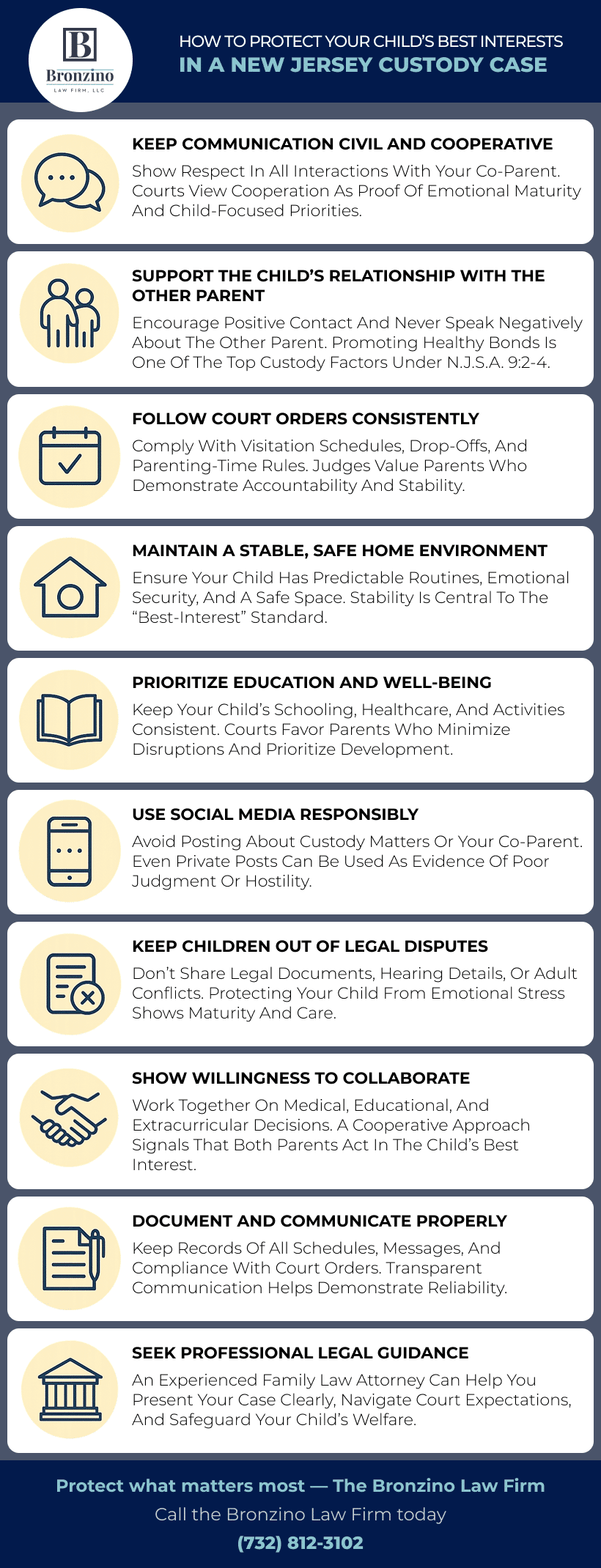Understanding the Child’s Best Interest Standard in New Jersey Custody Cases
 Few life circumstances are as distressful as child custody decisions. Even parents who are usually clear-headed have been known to waver between fear of being separated from their children for a period of time and anxiety about what a judge will make of their case. New Jersey child custody decisions are based on a thorough set of laws, each of which serves a single overriding principle: the “best interests of the child.” That criterion governs all of its decisions, from original custody determinations to modifications and enforcement proceedings, ensuring that each decision supports a child’s protection, stability, and psychological health.
Few life circumstances are as distressful as child custody decisions. Even parents who are usually clear-headed have been known to waver between fear of being separated from their children for a period of time and anxiety about what a judge will make of their case. New Jersey child custody decisions are based on a thorough set of laws, each of which serves a single overriding principle: the “best interests of the child.” That criterion governs all of its decisions, from original custody determinations to modifications and enforcement proceedings, ensuring that each decision supports a child’s protection, stability, and psychological health.
At Bronzino Law Firm, we know how huge a burden these types of cases are. We have been handling custody issues for years across Ocean County, so we understand how Family Courts handle delicate matters like these. We know what types of evidence judges base their decisions on. That insight helps our staff assist parents in preparing for each aspect of proceedings with precision and peace of mind.
The standard of best interests serves to protect children from the potential harm of having parental conflict determine custody. Instead of focusing on which parent “wins,” the court considers what solution will enable the child to develop and flourish in a protected environment. Through a focus on the child’s own welfare, the law attempts to maintain a sense of continuity during one of life’s most disruptive times, a family breakdown.
New Jersey’s Best Interests Framework Explained
In New Jersey family law, all custody determinations are based on a “best interest of the child” standard. The New Jersey Supreme Court adopted its framework of analysis for custody determinations in Kinsella v. Kinsella, 150 N.J. 276, 317 (1997), and outlined how custody determinations are compelled to place foremost consideration on what arrangement is best. The child’s protection, happiness, soundness of mind, and development are primordial. A parent’s convenience or wishes are of secondary interest.
The law actually differentiates between what a parent wants and what is best for a child. A parent may wish for a particular schedule or home arrangement. A judge’s task is to investigate what kind of living arrangement is going to be best for a child’s health. They analyze areas such as the child’s emotions, home life, and education. They consider each parent’s relationship with the child, the parent’s ability to be a consistent caregiver, and the stability of the home environment.
Also, many parents are convinced that courts are biased towards the mother having custody or that shared time is a typical award. New Jersey statutes actually assume nothing about a parent’s superiority for custody based on a parent’s gender. The determination by a court is sex-neutral and based wholly on a presentation of evidence related to child welfare. Just as shared, or equal, time is not a presumed outcome, it must be justified as being in the interest of a child. Some children flourish through multiple transfers between homes, while other children are better served by a more settled routine. A consideration by a court of the arrangement best furthering total child welfare, rather than a formulaic division of time, is its responsibility.
What Courts Evaluate: The 14 Factors Under N.J.S.A. 9:2-4
In determining custody, New Jersey courts also review a variety of connected factors that, collectively, spell out what configuration will be best for the child’s welfare. One of the factors of greatest importance is how cooperative and communicative each parent is. Of primary interest for judges is whether parents are successful at making mutual decisions without contentious behavior or manipulation. Cooperation demonstrates emotional maturity and a genuine interest in the child’s welfare rather than perpetual strife between parents.
The court also takes into consideration each parent’s eagerness to accept custody and to foster the child’s relationship with the other parent. A parent who fosters healthy contact and does not speak ill of the other parent is better positioned to provide a stable, loving environment. Similarly, behavior attempting to alienate the other parent significantly runs against the offending party.
The character of each child’s interactions and relationships also figures prominently. The judges study a child’s closeness with parents, siblings, and other household members to determine which household promotes a sense of belonging and security for the child. If there is any record of domestic violence, it is considered by the court with considerable caution. A record of abuse or coercion may deny custody or visiting privileges, wholly or partly, to preserve the abused parent and the child.
Also related to that is both child and parent safety. The courts evaluate whether one home poses a threat of physical or psychological harm, including being exposed to dangerous individuals or a setting. Sometimes, both parents’ wishes are even vetted, specifically where both parents are of enough maturity to have rational opinions regarding the living conditions. Those opinions, however, are balanced by other evidence but are never used as a determinative factor by themselves.
The medical, emotional, educational, and developmental needs of each child must also be considered. A child for whom special assistance or therapeutic intervention is necessary might be better off living with the parent who is best able to provide it. Stability of home life serves a parallel purpose, too, for it is through regular routines, conscientious caretaking, and familiarity of setting that a child experiences a sense of security.
Education is also a key concern. The courts review the quality and consistency of education, attempting to minimize disruptions and maintain access to a desirable program or network of support. Parent fitness is evaluated by an overarching criterion of psychological and physical health, capacity to parent, and ability to provide proper direction and protection.
The proximity of the homes of parents might have some effect on logistical factors such as school pickups and after-school activities. They evaluate how distance might have a bearing on a child’s everyday life and if it reduces a parent’s ability to maintain involvement. The quantity of one-on-one quality time each parent individually dedicated to a child also becomes a consideration, for consistency between being responsible for caregiving and being physically present tends to reflect a parent’s involvement and reliability.
Lastly, work scheduling of both parents is taken into consideration, specifically if the scheduling of work generates a conflict for a parent to care for a child’s needs or appropriately supervise a child. The child’s age and number of children also come into consideration, as young children or larger numbers of siblings might need alternative scheduling or custody configurations to maintain their sense of permanence and continuity. Whatever of these factors adds to a more complete picture of what indeed will be in a child’s best interest.
From Theory to Practice: Applying the Factors
In pursuing the “best interest of the child” standard, New Jersey courts don’t make an isolated weighing of factors. They observe how factors interact, intersect, and reveal the larger picture of a child’s daily life and eventual welfare. Examples below illustrate how factors come to shape actual custody determinations.
Cooperative, Child-Focused Parents
In situations where both parents manifest true cooperation and respect, a joint physical custody arrangement is likely to be granted by the court. Parents converse about schoolwork, doctor’s appointments, and extracurricular activities on a frequent basis. They accommodate each other’s scheduling and are a collaborative front when discussing a child’s behavior or emotional issue. When both homes are stable, secure, and are located within a comparable school district, children benefit from a consistent routine. Judges are likely to regard frequent, even-keeled involvement by both parents as being in a child’s best interest for purposes of fostering stability and healthy emotional growth.
The Alienating Parent
Contrast that with a scenario where a parent actively attempts to alienate a child against the other parent. Such a thing might involve derogatory remarks, obstructive visitation, or attempting to keep a child from communicating with a parent. Even if a parent provides a comfortable home and a decent standard of living, documented interference in a child’s relationship will significantly count against a parent. The court reads this behavior as being detrimental to a child’s emotional development. Where there is believable corroboration of alienation, for instance, text messaging, e-mails, or reports by teachers or therapists, judges also tend to diminish an offending parent’s time-sharing and may impose activities like counseling or supervised visitation to rebuild trust.
The Relocating Parent
Another common scenario is that of relocation disputes. A parent might receive a job offer on a different state’s border or at a distance far enough to interfere with the existing custody order. The court is then faced with competing factors to weigh against each other. The income and professional growth potential are weighed against the child’s proximity to their school, friends, and community. If the move creates tangible advantage for the child, such as better living conditions, proximity to extended family, or better schooling, the courts are likely to sanction it. However, if it seems to benefit the parent and sever roots of protection and a care network, judges are likely to refuse it.
Costly Errors to Avoid in Custody Proceedings
Negative Comments About the Co-Parent
One of the most harmful things a parent can do in/or after a custody battle is to talk badly about both parents to their children. Even short statements have a lingering effect. If a child observes a parent criticizing their other parent, it places the child between a rock and a hard place. The child wants to please their parents and can feel disloyal for wanting to love and respect them both. Children learn to internalize conflict, assuming that if their parents cannot tolerate one another, they may somehow be to blame for it. They may start suppressing emotions/experiences for fear of offending a parent, inhibiting normal communication and development of feelings. Psychological distress of a conflict of loyalties may manifest as anxiety, depression, or behavioral difficulties. Family courts take this kind of behavior very seriously. Repeated disrespect is indicative of a parent’s inability or unwillingness to foster a positive relationship between the child and the other parent. Since promoting that relationship is one of the overriding factors involved in granting custody, it seriously undermines a parent’s case. Text messages, e-mails, or statements by teachers, relatives, or mental health professionals are all possible evidence.
Parents who are civil even under stress are sending a strong message to their children: love and respect are compatible even if there is conflict or disappointment. That behavior, besides fortifying a child’s sense of emotional health, shows a judge that a parent’s peace of mind for their child is more important even than justice for themselves.
Sharing Legal Matters with Children
By sharing documents of a legal nature, quoting points heard during hearings, or revealing a lawyer’s strategy, a parent subjects a child to an adult struggle of which they are not capable of being a participant. Children are also inclined to try to please both of their parents, and by being exposed to a parent’s version of events, a child may be encouraged to accept a particular narrative. Exposure of this kind tends to produce anxiety, confusion, and guilt. A child cannot reconcile mutually inconsistent narratives about whose side they must choose. Parents run the risk of warping a child’s view of a parent, potentially interfering even further with a child’s ability to have equitable relationships.
Compelling a child to testify against the other parent or express a preference in open court is another serious error. It sets a child against one of their two favorite individuals, bringing about immense guilt and psychological disorientation. Children’s remarks are handled by the courts with utmost circumspection. Children are also known to modify their replies to avoid hurting a parent’s feelings or to avoid conflict themselves. Compelling a child to make a choice contaminates their sense of security and potentially inflicts lifelong psychological harm.
Parents who shield their children from the courtroom’s jurisdiction send a clear signal of protection and maturity. Protecting them from litigious details protects their sense of trust and allows them to focus on normal childhood experiences rather than adult conflict’s emotional consequences.
Disregarding Court-Ordered Schedules
Violating a custody order can have rapid and severe repercussions. Consequences include contempt charges, fines, a modification of the current custody order, or a combination of all three. A parent, with repeated violations, sends a message to the court that perhaps they are not qualified for maintaining the consistency and cooperation necessary for their children’s well-being.
Typical violations involve denying visits, not taking part in exchanges, or changing schedules unilaterally without the concurrence of the other parent and/or the permission of the court. For instance, a parent may choose to keep the child for an additional day following a holiday or end visits on short notice due to personal quarrels. The court pays specific attention if it occurs repetitively or intentionally, particularly if it seems to stem from a sense of resentment or trying to manipulate.
A documented record of compliance with all court orders is a solid indication of good faith and stability. Both parents should keep precise records of exchanges of visitation, efforts to keep each other informed, and events of failure to comply by the other party.
Parents who act through proper channels also show the court that they are reliable to act for the child’s best interest even amidst strained times. Those who fail to comply are at risk of losing credibility and, in extreme instances, even custody itself. The judicial process praises consistency, openness, and accountability, which are virtues reflective of stability, and children are most in need of these qualities amidst family change.
Social Media and Digital Communication Mistakes
Social media can significantly influence custody proceedings more often and more unpredictably than parents expect. Posts, pictures, and statements might seem trivial, but are perceived by a parent, juror, or judge as indicative of poor judgment, emotional fragility, or disrespect for the other parent. A court closely examines material where a custody dispute is mentioned, whether directly by statements about it, a derogatory statement regarding the co-parent, or pictures indicating risk-taking behavior.
The discovery process provides attorneys with a wide array of online activity. Private posts, including messages dispatched on group conversations or private conversations, are subpoenaable and admissible as evidence. By recognizing how electronic footprints provide insight into behavior and parental priorities, it becomes unsafe to provide opinions or experiences regarding the child or the other parent. Removing posts or trying to deny access after litigation is brought may be seen as unfavorable, as it appears to interfere with fact-finding by the court.
Public behavior of disrespect for the other parent, however, is even more problematic. Children are exposed, even indirectly, and may absorb the tension or conflict. Repeated, written, or public disparagement is also indicative of a failure on behalf of a parent to work towards a positive co-parent relationship, which is a negative factor for a parent in custody decisions. Posting images of illegal activity, unsafe behavior, or language perceived to be a threat erodes credibility and places a parent’s ability to provide a protective and nurturing home life into question.
To act responsibly, parents should be careful in all aspects of social media activities. Posting generic, positive updates and refraining from arguments, inflammatory remarks, or inflammatory images maintains a record of responsible online activity.
Even text messages sent on private phones are subject to subpoena, so self-discipline takes precedence. Email, text messages, and social media exchanges are open to courts, and whatever one posts online is subject to review. By being self-contained regarding internet communication and discreet about posting content for public and private consumption, parents exude steadiness, judgment, and concern about their child, all of which are greatly favored by courts during custody decisions.
When and How Courts Order Custody Evaluations
In some cases, a custody evaluation might be ordered by a court to obtain professional expertise about family dynamics and the child’s needs. Evaluations are not routine for all cases; judges are usually dependent on information offered by parents, including testimony, paperwork, and third-party reports. Still, in highly-contested conflicts, when abuse or neglect has been alleged, or a child’s best interest is not clear, a court might find that an evaluation will give direction.
Judges are given discretion whether an evaluation is necessary, and both parents are also entitled to request one. Evaluators, who are generally trained psychologists or social workers who are knowledgeable about family law, interview the child, parents, and, at times, other relatives, and also sometimes observe parent-child interactions. Their task is to give an impartial analysis of the family dynamics, both its positive aspects and its challenges, and recommend parenting time and decision-making powers.

It should be noted that evaluations are advisory, not determinative. The judges are under no obligation to adhere to every recommendation, yet evaluations are given great weight due to their provision of a neutral, professional analysis of issues about which it might be problematic for a court to opine on its own. The results of evaluators may inform decisions regarding custody allocation, parenting time allocation, and co-parent responsibility. Parents who are open, truthful, and professional during the evaluation process are more likely to achieve results that reflect both the impartial observations of the evaluator and their child’s best interests.
Protect Your Child’s Best Interests with Experienced Custody Attorneys
Custody proceedings are serious business, as they decide your child’s daily life and future development. Understanding how factors interact and how to advocate your case effectively is paramount to maintaining your own rights as well as your child’s best interests. Navigating New Jersey’s best interest standard efficiently requires experienced and knowledgeable family law lawyers. It involves more than mere advocacy for your time with your child; it requires predicting how judges examine communication, cooperation, home life, and your child’s needs. Parents benefit from advice for preparing paperwork, setting up reliability, and preparing for possible roadblocks like allegations of alienation or move litigation.
At Bronzino Law, we are committed to being there for you during this stressful process. Our attorneys possess considerable experience in Ocean County family courts and a keen regard for your child’s best interest. We endeavor to preserve your parental rights while also working towards a custody arrangement that supports your child’s stability, protection, and emotional well-being. You don’t need to face complicated choices by yourself. Trained professionals are here to guide you through custody issues with sharp focus, direction, and a clear head about what really counts: the best interest of your child.
If you have questions about your child’s custody in Point Pleasant, Bayville, Wall Township, Neptune, Red Bank, Asbury Park, Belmar, Sea Girt, Spring Lake, Rumson, Barnegat, or elsewhere in Ocean and Monmouth County, call us today at (732) 812-3102 or contact us online. With proper guidance, you’ll better understand how to proceed with your child’s best interest paramount at all times.








